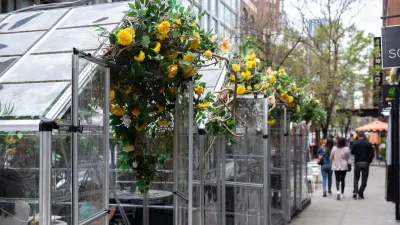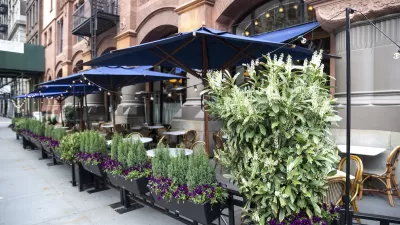Examining both sides of a debate about whether the urban revival's high-water mark is visible in the restaurant sector.

Alan Erenhalt writes a provocative article, concerned with the "limits of café urbanism." After noting that "[i]n many comeback neighborhoods, it’s a reasonable estimate that locally owned restaurants are responsible for at least three-quarters of the resurgence," Erenhalt looks for, and finds, evidence that the momentum supplied by restaurants might be starting to "peter out."
In 2016, according to one reputable study, the number of independently owned restaurants in the United States -- especially the relatively pricey ones that represent the core of café urbanism -- declined by about 3 percent after years of steady growth. The remaining ones were reporting a decline in business from a comparable month in the previous year.
Erenhalt also find anecdotal evidence to support those claims in the Clarendon district in Arlington, Virginia.
Enter Joe Cortright into the debate, countering with Erenhalt's conclusions along two lines of thinking. The first is that "café urbanism" assigns too much power to restaurants as drivers of urban revival. Second, Cortright explains, "the data clearly show that the restaurant business continues to expand. If anything, nationally, we’re in the midst of a continuing and historic boom in eating out." The central question of this debate, for Cortright, is whether the country is moving toward an "experience economy." He sees reason to believe the country is still developing as an experience economy, and urban eateries will continue to increase.
FULL STORY: The Limits of Café Urbanism

Alabama: Trump Terminates Settlements for Black Communities Harmed By Raw Sewage
Trump deemed the landmark civil rights agreement “illegal DEI and environmental justice policy.”

Study: Maui’s Plan to Convert Vacation Rentals to Long-Term Housing Could Cause Nearly $1 Billion Economic Loss
The plan would reduce visitor accommodation by 25% resulting in 1,900 jobs lost.

Planetizen Federal Action Tracker
A weekly monitor of how Trump’s orders and actions are impacting planners and planning in America.

Wind Energy on the Rise Despite Federal Policy Reversal
The Trump administration is revoking federal support for renewable energy, but demand for new projects continues unabated.

Passengers Flock to Caltrain After Electrification
The new electric trains are running faster and more reliably, leading to strong ridership growth on the Bay Area rail system.

Texas Churches Rally Behind ‘Yes in God’s Back Yard’ Legislation
Religious leaders want the state to reduce zoning regulations to streamline leasing church-owned land to housing developers.
Urban Design for Planners 1: Software Tools
This six-course series explores essential urban design concepts using open source software and equips planners with the tools they need to participate fully in the urban design process.
Planning for Universal Design
Learn the tools for implementing Universal Design in planning regulations.
Caltrans
Smith Gee Studio
Institute for Housing and Urban Development Studies (IHS)
City of Grandview
Harvard GSD Executive Education
Toledo-Lucas County Plan Commissions
Salt Lake City
NYU Wagner Graduate School of Public Service





























